 Petzlover
Petzlover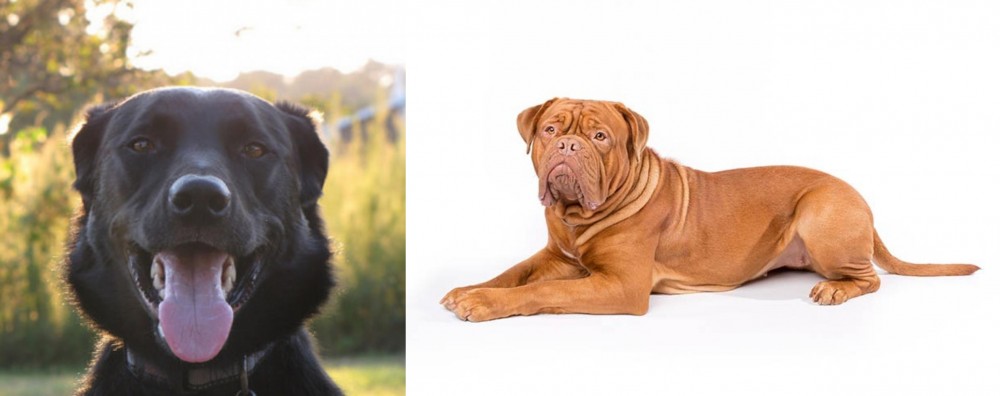 Borador is originated from United States but Dogue De Bordeaux is originated from France. Borador may grow 10 cm / 3 inches shorter than Dogue De Bordeaux. Borador may weigh 39 kg / 85 pounds lesser than Dogue De Bordeaux. Borador may live 5 years more than Dogue De Bordeaux. Both Borador and Dogue De Bordeaux has almost same litter size. Borador requires Moderate Maintenance. But Dogue De Bordeaux requires Low Maintenance
Borador is originated from United States but Dogue De Bordeaux is originated from France. Borador may grow 10 cm / 3 inches shorter than Dogue De Bordeaux. Borador may weigh 39 kg / 85 pounds lesser than Dogue De Bordeaux. Borador may live 5 years more than Dogue De Bordeaux. Both Borador and Dogue De Bordeaux has almost same litter size. Borador requires Moderate Maintenance. But Dogue De Bordeaux requires Low Maintenance
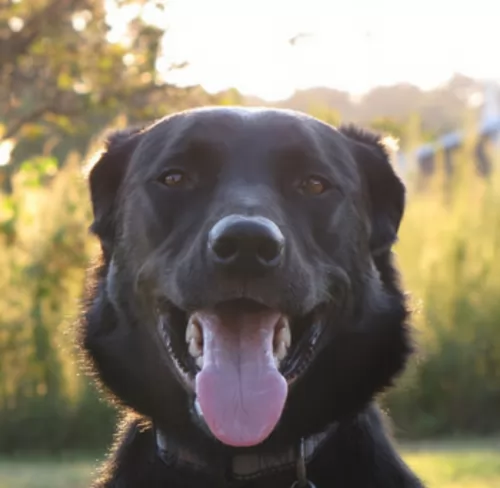 Hybrid breeds have become popular in the last decade or so. The Borador, hailing from Northern America, is one of these popular crossbreeds between two very popular dog breeds - the Border Collie and the Labrador Retriever. Between the two dog breeds, you get extraordinary intelligence, energy and a wonderful temperament.
Hybrid breeds have become popular in the last decade or so. The Borador, hailing from Northern America, is one of these popular crossbreeds between two very popular dog breeds - the Border Collie and the Labrador Retriever. Between the two dog breeds, you get extraordinary intelligence, energy and a wonderful temperament.
You first started hearing about this dog breed in the early 21st century. However each of the two breeds brought together to produce the Borador have got reasonable lengthy histories.
 The Dogue de Bordeaux is an ancient French dog breed and his history goes so far back that it is difficult to have accurate records of his origin.
The Dogue de Bordeaux is an ancient French dog breed and his history goes so far back that it is difficult to have accurate records of his origin.
During the 1700s he was used as a guard dog, with theories suggesting that several Mastiff type breeds were the closest ancestors.
For centuries the Bordeaux Mastiff, also referred to as the Bordeaux Bulldog, came in two size varieties, with the larger version being the Dogue de Bordeaux. It is this large dog which made its appearance in the Hollywood movie ‘Turner & Hooch’, shooting him into more recognition and interest.
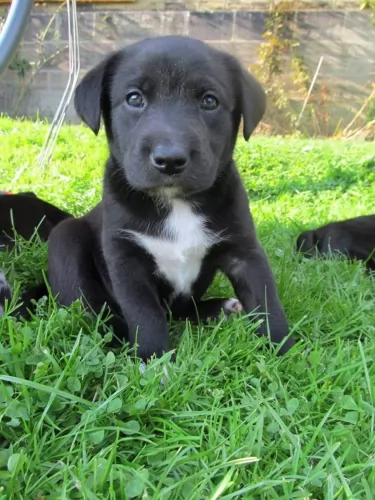 The Borador is a medium to large sized working dog which is well well-proportioned and muscular. His size can’t be carved in stone, but generally he will be in size from 40 – 57cm and weight in the region of 18 and 26 kg. His coat can vary significantly, leaning more towards one particular breed than the other. So the coat can be short and smooth or long and wavy or straight.
The Borador is a medium to large sized working dog which is well well-proportioned and muscular. His size can’t be carved in stone, but generally he will be in size from 40 – 57cm and weight in the region of 18 and 26 kg. His coat can vary significantly, leaning more towards one particular breed than the other. So the coat can be short and smooth or long and wavy or straight.
The Borador essentially has medium-sized ears which are floppy and the tail is medium-length. Sometimes the Borador will have the black and white coat of the Border Collie or he could have a brownish/beige colour from a golden Labrador.
When your energetic Borador is trained and socialized, he becomes a great family member and he gets on well with children and other pets.You’ll find that he often has the sweet, amicable temperament of the Labrador while having the sharp, alert intellect of the Border Collie.
Most Boradors are also good watchdogs and will bark at strangers, but because they are so amicable, from barking, they can quickly become a stranger’s friend.
 The Dogue de Bordeaux is a large molosser type dog with a large head, standing at 60 – 67cm and weighing anything between 54 and 65kg. His weight comes more from his muscular, powerful build rather than his height.
The Dogue de Bordeaux is a large molosser type dog with a large head, standing at 60 – 67cm and weighing anything between 54 and 65kg. His weight comes more from his muscular, powerful build rather than his height.
He is a powerful looking dog and his short coat is loose-fitting and is an attractive rich reddish brown color. There are wrinkles around the face with the nose being somewhat pinkish-orange as opposed to black.
The eyes are wide apart and are hazel. He has short to medium length floppy ears and where once the thick tail was docked, giving him a powerful, distinctive look, it is mostly left long today.
He is a confident, self-assured, territorial dog who will require training and socialization if he is to know his place in the home. He is a powerful mastiff-type dog, who without training can be stubborn, arrogant and somewhat aggressive towards strangers.
His looks and his territorial nature make him an excellent watchdog. He is no push-over and isn’t a good choice for the first time dog owner.
Without a strong, firm owner, he could prove difficult to handle. He is calm and laid back with children in the home and he can get along well with other pets if he has been brought up with them since puppy-hood.
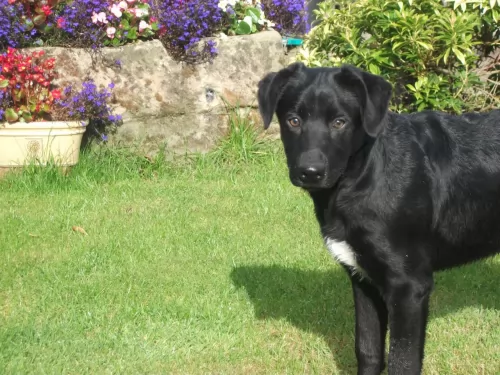 The Borador is an intelligent dog that can be trained. He is a sociable dog and is friendly to all members of his human family, willing to extend a paw of friendship to strangers as well.
The Borador is an intelligent dog that can be trained. He is a sociable dog and is friendly to all members of his human family, willing to extend a paw of friendship to strangers as well.
The Borador is also a friend of children and other pets. This combination of breeds is very energetic and you can’t just leave him for days on end in the backyard. He will need exercise and walks as well as ball games. When you become involved in his games, you tighten the bond between you and this is what this social, outgoing dog loves.
The Borador is going to make a wonderful pet because he is a mix of two very popular dog breeds. Give him all he deserves as a member of your family and you’ll have the perfect friend and companion for life.
 The Dogue de Bordeaux isn’t a big, boisterous kind of dog but is rather calm and relaxed. As a watchdog however, he can surprise you and become quite active, showing agility for such a hulk.
The Dogue de Bordeaux isn’t a big, boisterous kind of dog but is rather calm and relaxed. As a watchdog however, he can surprise you and become quite active, showing agility for such a hulk.
He can adapt to life in the city or the country but even though he appears lazy, he will need moderate daily exercise.
He loves his human family and wants to be constantly with them. He is stubborn but will do well with training and socialization.
Calm and easy-going and with his easy-to-maintain short, soft coat, be prepared for some drooling and snoring from this loving, devoted large pet of yours.
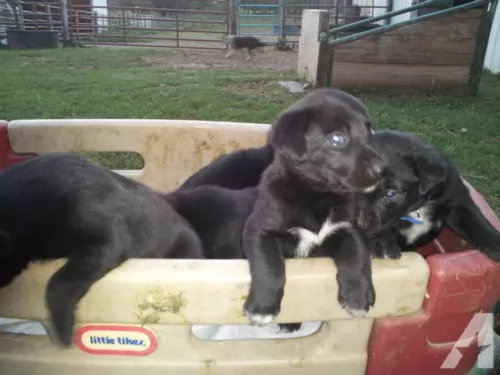 You won’t find serious health problems with your Boradors, as he is a robust breed. Nonetheless, there are some ailments that as a dog owner, you need to be aware of for your Borador.
You won’t find serious health problems with your Boradors, as he is a robust breed. Nonetheless, there are some ailments that as a dog owner, you need to be aware of for your Borador.
Skin ailments – you don’t want to see your dog scratching or licking continuously so you want to be aware of things like parasites and allergies. Skin diseases can be debilitating for a dog and can even require lifelong treatments. Yes, corticosteroids can help with itchy rashes, but the best move is to try and avoid skin ailments by ensuring a nutritious diet rich in minerals and vitamins and which includes some raw meat.
Always be checking your pet for skin problems such as ringworm, caused by a fungus and found on your dog and which appear as scaly patches and hair loss.
Hip Dysplasia – an inherited problem with the hip joints. No-one can predict when hip dysplasia settles in, but it can be as early as 4 months of age.Your dog shows signs of stiffness and may not be his energetic self. Some dog owners want to see certificates first that the parents of puppies have been hip-cleared before they buy a puppy.
 The Dogue De Bordeaux doesn’t have as long a lifespan as many other dogs, but with good care, can go to 7 – 10 years of age.
The Dogue De Bordeaux doesn’t have as long a lifespan as many other dogs, but with good care, can go to 7 – 10 years of age.
Because he is a brachycephalic breed – a short-nosed dog such as the Boxer, Pug and Bulldog – he may well have the same number of teeth as other dogs, but the teeth are crowded, putting dogs like this at higher risk of getting dental disease.
His teeth will need to be brushed 2 or 3 times a week to prevent plaque and tartar getting trapped.
Brachycephalic Syndrome is also something to watch out for with your Dogue de Bordeaux. It’s an upper respiratory disorder which can bring on difficulty with breathing because of the crowding of tissue and narrower airways.
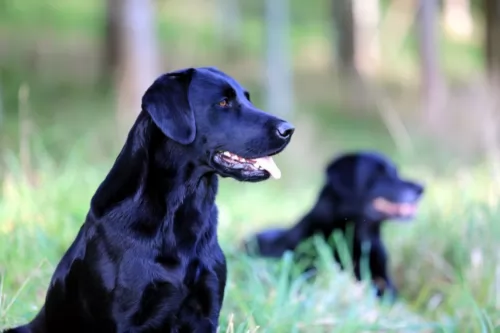 The Borador may have inherited the moderate shedder characteristics of the Border Collie or the more intense shedding of the Labrador Retriever. He will require a good brush at least twice a week to ensure you remove loose hairs so as to keep his coat shiny and healthy. Check your dogs ears too for yeast infections.
The Borador may have inherited the moderate shedder characteristics of the Border Collie or the more intense shedding of the Labrador Retriever. He will require a good brush at least twice a week to ensure you remove loose hairs so as to keep his coat shiny and healthy. Check your dogs ears too for yeast infections.
Puppies and young Boradors are full of energy and they will require a diet that has an excellent protein content. If you’re unsure about how to feed your Borador, speak to your vet as some dogs need more calories depending on their level of activity.
Certainly if your dog has allergies, you may have to look for a special diet but otherwise a top brand commercial dog food can be a good choice if you include some home prepared food such as rice, vegetables and meat. It is important to give your dog some raw meat every now and then as well. Always have a bowl of cool, fresh water available for your pet 24/7.
 He isn’t the most active dog and he is inclined to snooze quite a bit throughout the day. It will nonetheless be a good idea to include him in your daily walks and allow him to take part in a ball game now and again.
He isn’t the most active dog and he is inclined to snooze quite a bit throughout the day. It will nonetheless be a good idea to include him in your daily walks and allow him to take part in a ball game now and again.
The Dogue de Bordeaux needs to be fed a high-quality dog food in keeping with his large size and age.
This dog is known for drooling, and because of his wrinkled face, you’ll need to be watching the facial area that it is kept clean and dry to avoid skin infections. Check his ears at the same time to ensure they are free from dirt and wax.
The short coat does shed throughout the year, and you will need to be brushing him down twice a week to remove all those loose hairs.